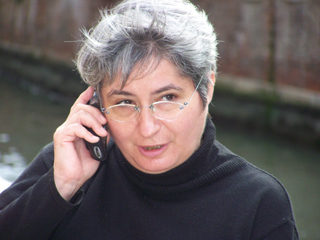Introducing New Staff 8
In search of linguistics and philosophy

MOESCHLER-REBOUL, Anne Colette
(Visiting professor, September 2010)
I am a philosopher and a linguist, now mainly working in cognitive sciences. I am a specialist of pragmatics (the use of language in communication). I am currently a senior researcher at the National Center for Scientific Research (CNRS) in France and belong to a cognitive neuroscience laboratory, L2C2 (Laboratory on Language, the Brain and Cognition), of which I am the vice-director.
In the past few years, I have pursued two main topics: the evolution of language and language acquisition in autistic children. Regarding the evolution of language, I have based my approach on the distinction between an inner and a public language, defending a cognition-based view of the evolution of the first and a social view of the evolution of public languages. Regarding language acquisition in autistic children, longitudinal corpora have been recorded from nine autistic children during three years. Though preliminary analyses of these data have been made, further analyses are now being done, which will be published in due course.
Right now, I am investigating the passage from situated or embodied cognition to nonsituated or abstract cognition, combining a theoretical approach, based on an extensive review of the existing and abundant empirical literature, and an experimental approach in collaboration with neuroscientist colleagues at L2C2. During my stay at ILCAA, I will be pursuing the theoretical approach.
From the theoretical point of view, it seems clear that language is both situated in the sense that lexical meaning (at least for concrete terms) is grounded in individual experience (perception, sensation, action) and is the basis of non-situated cognition, given its well-known characteristics of deplacement (the possibility of speaking of absent or non-existing things) and of generativity (the possibility, through syntactico-semantic compositionality of producing linguistic representations which are constrained by formal rather than by content rules). The possibility of non-situated cognition has many evolutionary advantages, chief among which is the possibility to abstract oneself from the ongoing situation or immediate environment, giving raise to abstract thought (including conditional and counterfactual reasoning), long-term planification (including planified and distance cooperation), fiction, etc. It brings with it, however, some major problems, among which the ability to deceive others as well as oneself on the nature of the situations to be faced and on the answers to be made to them, raising important ethical and political (in the broad sense) concerns as to the ability of humans to take the right decisions. Recent experimental work on pathologies of belief, from the fairly common self-deception or risk behaviors, to more pathological affections such as anosognosia (denial of illness, including paralysis or blindness), pinpoints the role of control processes to filter representations, and suggests that emotions play an important role in these processes. The present goal is to articulate as precisely as possible the interaction between representations and emotions in the creation of true or erroneous beliefs, not excluding the possibility that the control mechanisms themselves can occasionally lead to error.
Copyright © 2010 Research Institute for Languages and Cultures of Asia and Africa. All Rights Reserved.
